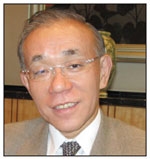Japan counting the cost of March disasters
 |
| Tanizaki Yasuaki |
Japanese ambassador Tanizaki Yasuaki provides some answers for VIR’s Nguyen Hanh.
Please tell us about your government’s efforts to help the Japanese economy recover from the tragedies.
There are two areas which our government has been targeting during this period of recovery. One is short-term recovery and the other is medium- and long-term recovery. As far as the short-term recovery efforts are concerned, I think that the central government together with local governments of the disaster-stricken areas have been succeeding in restoring living essentials like the provision of enough food, food stuffs, water, medical equipment and also some mental care to the victims.
But there remains a shortage of doctors. Because of the accident at the nuclear power plants in Fukushima Dai-ichi, inhabitants in metropolitan and suburban areas, especially Tokyo, are still short of electricity.
As for the medium and long-term destruction of the region, it will take time and require a huge amount to finance recovery. We have not yet calculated exactly how much it will cost, but according to provisional estimate of the Japanese think-tank, the total quantitative damage amounts to about $200 billion, a huge amount.
Japan is Vietnam’s largest bilateral aid donor. Will Japan’s losses impact on its ODA for Vietnam?
As far as impacts on ODA are concerned, it’s not yet certain. I have not received any instructions concerning future ODA which indicate any change. I hope that no news means good news. I think ODA is highly regarded among Japanese tax payers as an international contribution and thanks to the ODA that we have contributed over the last decades, Japan enjoys its reputation in international society. So although we including our financial institutions face very difficult challenges, I hope that with such a strong view, the losses should not affect our ODA. In my view, Japan’s ODA commitment will and should be maintained.
Japanese taxpayers will possibly keep a closer watch on the use of Japan’s ODA given their homeland’s financial needs for economic rebuilding. Did Vietnam use Japan’s ODA efficiently in your view and will it need to raise Japanese ODA spending quality in this context?
Particularly in the past several years, Japanese taxpayers have paid more attention to the efficiency and effectiveness of Japanese ODA. Japan’s government has also tried to ensure more efficiency for its ODA. But when I talk about the efficiency of Japan ODA-financed projects in Vietnam, I am very positive. So far Japan ODA-funded projects are being implemented very effectively. Of course there are some exceptions, some projects are delayed because of difficulties in moving inhabitants away from the project sites for construction. But persuading people to move from their homes takes time, we understand this.
Some Japanese companies in Vietnam import a lot from Japan including auto parts and electronic components for assembling and production in Vietnam. How has the disaster affected those firms?
That’s very short term impact. It is not only the impact on Vietnam, but on the world because the companies located in the disaster areas stopped operations. Some of those companies are widely-known producers of semi-conductors which are used, for instance, in automobiles. So it is serious not only for the Japanese automobile industry, but also European automobile industry and the US automobile industry which are very much dependent on getting such parts. But many automobile companies already tried to produce in other countries to offset those negative impacts. It is commensurate to the speed of reconstruction in that region. Perhaps it will take a few months for those companies to go back to normal operations.
What will be the medium and long-term influence on direct investment from Japan to Vietnam?
It is still premature to clearly say what the medium and long-term impacts are. There are both negative and positive elements in terms of increasing direct investment from Japan to the Vietnamese market. Despite this disaster, the Japanese yen is still very strong. In general, the strong yen invites potential Japanese investors to foreign countries like Vietnam.
Second, we will learn a lesson from this disaster. Too heavy a concentration for production sites is very risky. Some automobile companies, for instance, might want to diversify their production sites from just one area in Japan to other countries. Again, it is still too early to comment on this.
What about the possibility of Japanese investment retreating, given the opportunities for businesses to get involved in rebuilding their home economy?
There are different outlooks. One is for big companies, and one is for medium and small-scale companies. For small and medium-sized companies which were damaged by the disaster, I think that it is the time for them not to simply rebuild their business from scratch domestically; they might prefer to deploy in foreign countries.
What the stars mean:
★ Poor ★ ★ Promising ★★★ Good ★★★★ Very good ★★★★★ Exceptional
Related Contents
Latest News
More News
- Hermes joins Long Thanh cargo terminal development (February 04, 2026 | 15:59)
- SCG enhances production and distribution in Vietnam (February 04, 2026 | 08:00)
- UNIVACCO strengthens Asia expansion with Vietnam facility (February 03, 2026 | 08:00)
- Cai Mep Ha Port project wins approval with $1.95bn investment (February 02, 2026 | 16:17)
- Repositioning Vietnam in Asia’s manufacturing race (February 02, 2026 | 16:00)
- Manufacturing growth remains solid in early 2026 (February 02, 2026 | 15:28)
- Navigating venture capital trends across the continent (February 02, 2026 | 14:00)
- Motivations to achieve high growth (February 02, 2026 | 11:00)
- Capacity and regulations among British areas of expertise in IFCs (February 02, 2026 | 09:09)
- Transition underway in German investment across Vietnam (February 02, 2026 | 08:00)

 Tag:
Tag:


















 Mobile Version
Mobile Version